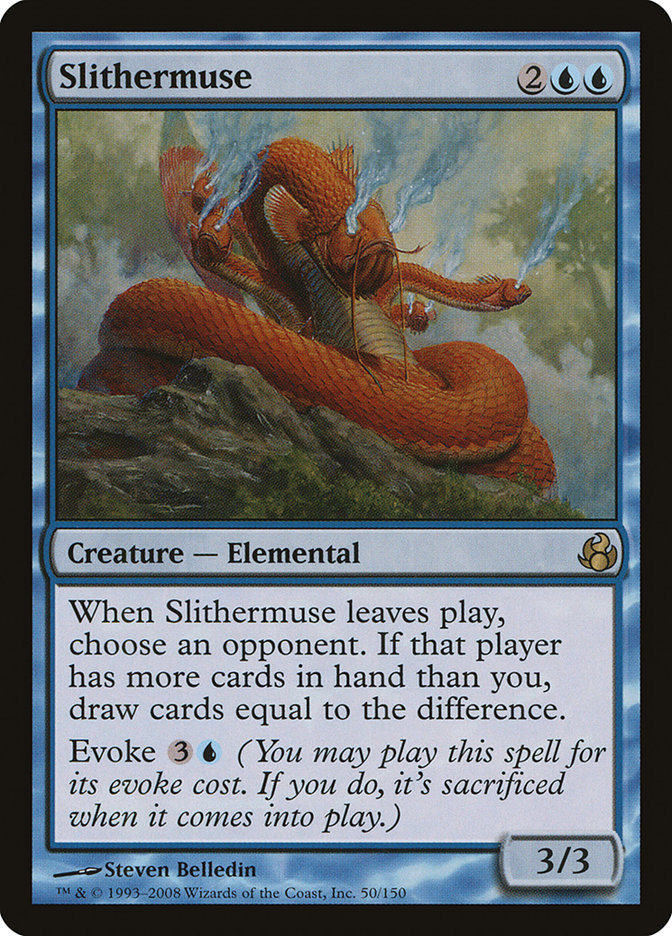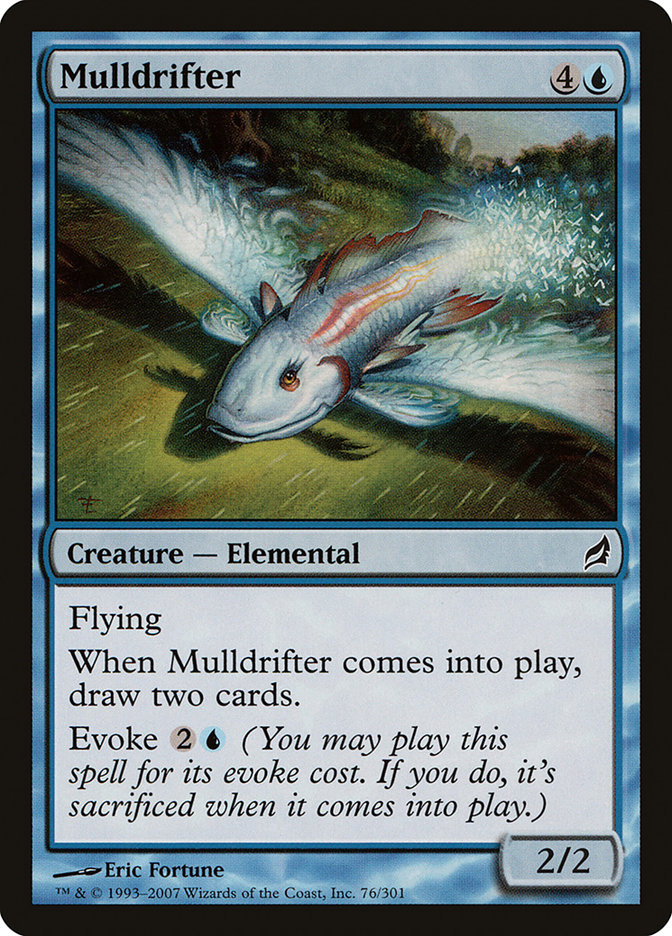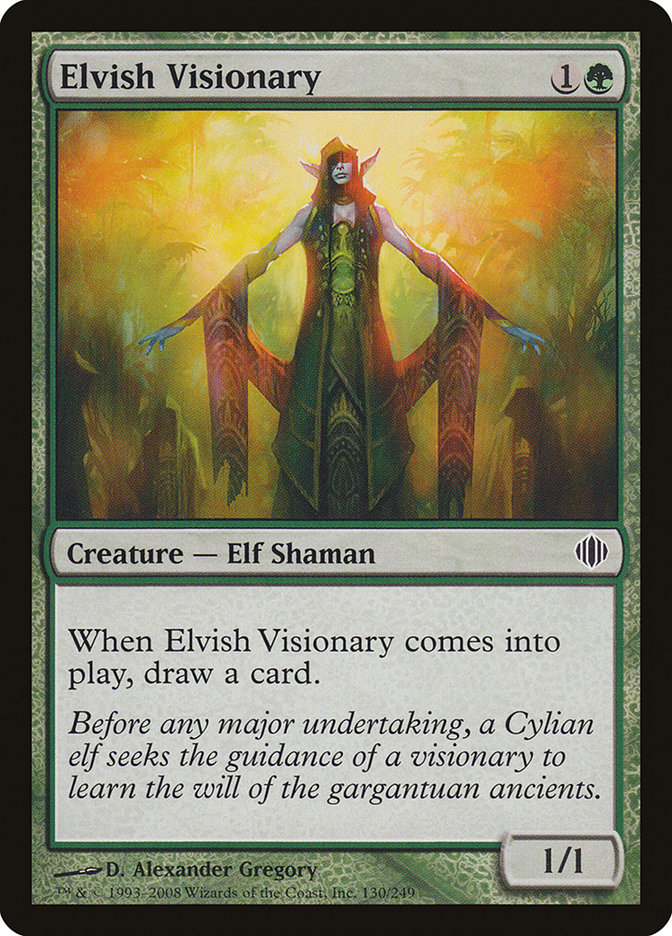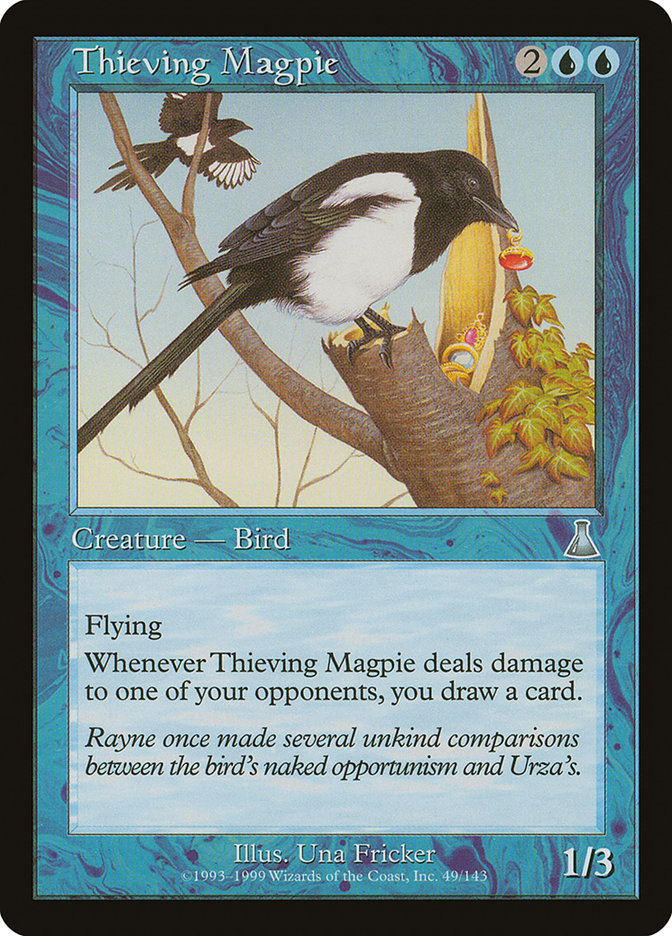Slithermuse MTG Card
| Mana cost | |
| Converted mana cost | 4 |
| Rarity | Rare |
| Type | Creature — Elemental |
| Abilities | Evoke |
| Released | 2008-02-01 |
| Set symbol | |
| Set name | Morningtide |
| Set code | MOR |
| Power | 3 |
| Toughness | 3 |
| Number | 50 |
| Frame | 2003 |
| Layout | Normal |
| Border | Black |
| Illustred by | Steven Belledin |
Text of card
When Slithermuse leaves play, choose an opponent. If that player has more cards in hand than you, draw cards equal to the difference. Evoke (You may play this spell for its evoke cost. If you do, it's sacrificed when it comes into play.)
Cards like Slithermuse
Slithermuse is a unique entry in the pantheon of creature cards within Magic: The Gathering. Much like its contemporaries, it taps into the theme of drawing cards when it leaves the battlefield. Cards such as Mulldrifter also offer card draw utility, with an evocation ability that allows players to draw two cards. However, Slithermuse can potentially net more cards, depending on the number of cards in the opponent’s hand, which can create a significant swing in game dynamics.
Another peer in this comparison is Elvish Visionary. While it ensures a card upon entering the battlefield is notably less conditional than Slithermuse, it doesn’t have the same potential for drawing multiple cards. By contrast, when looking at creatures with similar leave-the-battlefield effects, Thieving Magpie stands out but requires damage to an opponent for a single card draw, making it less reliable than the sometimes predictable exit of Slithermuse.
Ultimately, Slithermuse can be a powerhouse in the right scenario, reshaping the state of your hand, especially when combined with sacrificial or blink effects. Its ability to capitalize on the opponent’s card advantage makes it an intriguing choice for players looking to maximize their draw potential from a single creature.
Card Pros
Card Advantage: When Slithermuse leaves the battlefield, its effect potentially refills your hand by drawing cards equal to the number of cards in the opponent’s hand, which can dramatically shift the balance in your favor.
Resource Acceleration: This creature can act as a form of resource acceleration by enabling you to maximize your mana usage. Even though it doesn’t directly generate mana or tokens, having a full grip of cards can translate to more plays and a quicker development of your board state.
Instant Speed: While Slithermuse itself isn’t an instant, its Evoke cost can be paid at instant speed. This allows for strategic timing, particularly when you’re looking to maximize the number of cards it will allow you to draw during the opponent’s end step.
Card Cons
Discard Requirement: Slithermuse asks you to forego a creature of value when it leaves the battlefield in order to realize its potential card advantage, which might not align with your gameplay or strategy, especially when resources are stretched thin.
Specific Mana Cost: With a casting cost that includes both generic and blue mana, Slithermuse demands a deck tailored around these color requirements, potentially limiting its adoption in decks that don’t favor blue mana or multi-color adaptability.
Comparatively High Mana Cost: Despite offering an interesting card advantage based on opponents’ hand size, Slithermuse comes at a fairly high mana cost for an effect that has no immediate impact unless it’s leaving the battlefield, making it a less than optimal choice in a fast-paced meta where lower costing creatures can provide value right away.
Reasons to Include in Your Collection
Versatility: Slithermuse is a unique creature card that can integrate seamlessly into decks that strategize around graveyard manipulation or creature-bounce tactics, offering a surprising degree of flexibility.
Combo Potential: With its ability to refill your hand when it leaves the battlefield, Slithermuse pairs well with sacrifice outlets and reanimation spells, able to initiate powerhouse plays that can overwhelm opponents.
Meta-Relevance: In an environment rich with creature-based strategies, Slithermuse’s presence can deter opponents from overextending, making it a strategic addition for disrupting the opponent’s board presence.
How to beat
Slithermuse is a unique creature card in Magic: The Gathering that can pose quite the challenge in the right deck. When it leaves the battlefield, your opponent could potentially restock their hand, drawing cards equal to the difference between their hand and the number of cards in your hand. This ability makes it important to carefully manage hand sizes when you’re up against this elusive creature.
One effective strategy to counter Slithermuse is to maintain card advantage or parity. By keeping the number of cards in your hand at a similar level to your opponent’s, you can minimize the impact of Slithermuse’s triggered ability. Instant-speed removal spells can be particularly helpful, allowing you to respond to the threat of Slithermuse being sacrificed or leaving the battlefield in other ways, potentially when your opponent has a fuller hand, to limit their card draw advantage.
Additionally, having graveyard control mechanisms in your deck can mitigate the aftermath of Slithermuse’s leave-the-battlefield ability. Cards that exile from the graveyard or prevent cards from going there in the first place can be invaluable. By addressing Slithermuse effectively, you ensure that the scales of card advantage don’t tip too heavily in your opponent’s favor, keeping the game in balance and preserving your path to victory.
Where to buy
If you're looking to purchase Slithermuse MTG card by a specific set like Morningtide, there are several reliable options to consider. One of the primary sources is your local game store, where you can often find booster packs, individual cards, and preconstructed decks from current and some past sets. They often offer the added benefit of a community where you can trade with other players.
For a broader inventory, particularly of older sets, online marketplaces like TCGPlayer, Card Kingdom and Card Market offer extensive selections and allow you to search for cards from specific sets. Larger e-commerce platforms like eBay and Amazon also have listings from various sellers, which can be a good place to look for sealed product and rare finds.
Additionally, Magic’s official site often has a store locator and retailer lists for finding Wizards of the Coast licensed products. Remember to check for authenticity and the condition of the cards when purchasing, especially from individual sellers on larger marketplaces.
Below is a list of some store websites where you can buy the Slithermuse and other MTG cards:
 BUY NOW
BUY NOW BurnMana is an official partner of TCGPlayer
- eBay
- Card Kingdom
- Card Market
- Star City Games
- CoolStuffInc
- MTG Mint Card
- Hareruya
- Troll and Toad
- ABU Games
- Card Hoarder Magic Online
- MTGO Traders Magic Online
See MTG Products
Legalities
Magic the Gathering formats where Slithermuse has restrictions
| Format | Legality |
|---|---|
| Commander | Legal |
| Legacy | Legal |
| Modern | Legal |
| Oathbreaker | Legal |
| Vintage | Legal |
| Duel | Legal |
| Predh | Legal |
| Penny | Legal |
Rules and information
The reference guide for Magic: The Gathering Slithermuse card rulings provides official rulings, any errata issued, as well as a record of all the functional modifications that have occurred.
| Date | Text |
|---|---|
| 2008-04-01 | Effects that cause you to pay more or less to cast a spell will cause you to pay that much more or less while casting it for its evoke cost, too. That’s because they affect the total cost of the spell, not its mana cost. |
| 2008-04-01 | Evoke doesn’t change the timing of when you can cast the creature that has it. If you could cast that creature spell only when you could cast a sorcery, the same is true for cast it with evoke. |
| 2008-04-01 | If a creature spell cast with evoke changes controllers before it enters the battlefield, it will still be sacrificed when it enters the battlefield. Similarly, if a creature cast with evoke changes controllers after it enters the battlefield but before its sacrifice ability resolves, it will still be sacrificed. In both cases, the controller of the creature at the time it left the battlefield will control its leaves-the-battlefield ability. |
| 2008-04-01 | If you’re casting a spell “without paying its mana cost,” you can’t use its evoke ability. |
| 2008-04-01 | When you cast a spell by paying its evoke cost, its mana cost doesn’t change. You just pay the evoke cost instead. |
| 2008-04-01 | Whether evoke’s sacrifice ability triggers when the creature enters the battlefield depends on whether the spell’s controller chose to pay the evoke cost, not whether they actually paid it (if it was reduced or otherwise altered by another ability, for example). |
| 2008-04-01 | You choose an opponent when the ability resolves. Once you determine how many more cards than you that player has, that number is locked in as the amount you’ll draw. |



